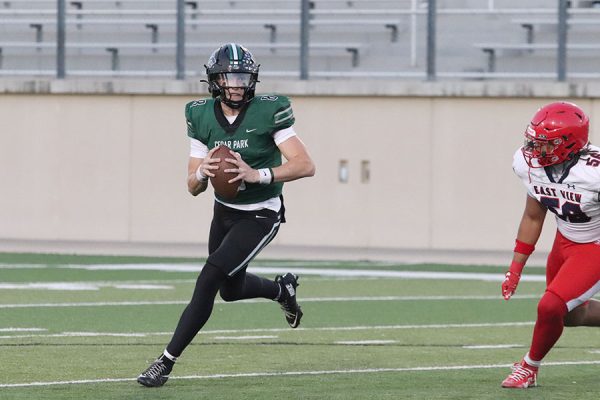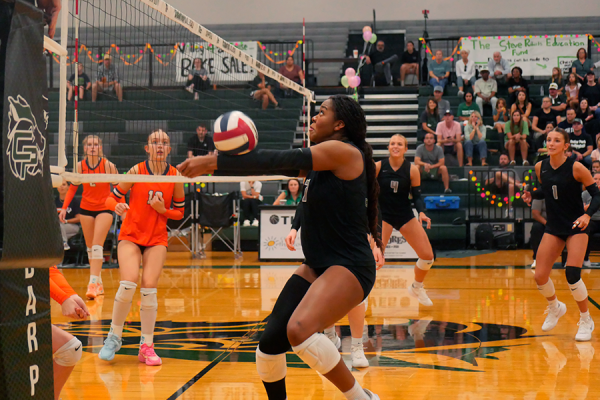Diving Towards Greatness
Sophomore Shares Journey on the Dive Team
Photo courtesy of Ashley Poulsen
Pierce Brooke dives at the 2020 regional swim and dive meet. Brooke began diving seven years ago because of his interest in swimming and gymnastics. “I really like that diving keeps me in shape,” Brooke said. “Other than that my favorite part is the amazing friends I make.”
November 3, 2020
Imagine having to jump off a small board at a fast speed, trying to flip, all while heading straight towards a cold pool. This is something that sophomore diver Pierce Brooke does almost everyday.
Brooke has been diving for almost seven years. He first got involved in the sport because of his participation in swimming and gymnastics. His swim coach was the one that suggested Brooke pursue diving.
“I used to do swimming and gymnastics at the same time when I was younger,” Brooke said. “I personally didn’t think about doing diving but it was recommended by one of my swim coaches.”
So, combining his skills in gymnastics and swim, Brooke started training to become a diver at the age of eight. When first starting to dive, Brooke loved the sport. Now it is more of a love-hate type deal, as is the case with many people in their sports.
“I actually [loved] diving [when I started],” Brooke said. “It wasn’t until like a year or two afterwords before I saw it as a chore rather than a choice. [Diving] is tiring and really hard, but I’m diving for college so [I haven’t quit yet].”
In order to be a good diver and keep in shape, Brooke not only practices for two to three hours at a time but also practices five to six days a week. Although his skills are showcased in the water, most of the training isn’t even spent in the water.
“We normally run and do some basic warming up for about 15 minutes, then we go to the harder work section which mainly includes core,” Brooke said. “After that we stretch and do dry board or mat flips (which is basically diving without water), finally we will then get in the water to practice until the end of practice.”
Though this sounds like a lot, every type of training Brooke does is essential to being a successful diver. In order to perform well, a diver needs to train many things because it helps in a combined effort to achieve the desired result.
“In diving you can’t really do flips without having the muscles to flip,” Brooke said. “Stretching is to make sure you are flexible enough to make sure you can be small to flip fast, and core is used to keep you right in your dive.”
Last year, Brooke was one of two divers. However this year he is the only member of the school’s dive team. Despite being the only one, Brooke said he still enjoys being on the team.
“Honestly, [being the only one on the dive team] is not that bad because I [still] get to see some club divers at high school meets that I know which doesn’t make the experience terrible,” Brooke said. “Diving is an individual sport, but it does help to have people there to support you. In both club and high school I get [support] so [being the only team member] is not that much different [than normal].”
In his first year competing as a freshman, Brooke made it not only to regionals but also to state. That year, Brooke finished 4th in diving overall. Since then, he also got 4th in the semi-finals at nationals for club, beating a national champion.
“From my own experience and at the level that I dive at, state is where I represent where I belong,” Brooke said. “I dove with people I normally compete with at club who I [know] are better, but still did decent[ly]. [My achievements] help me to reassure myself that I’m better than I put myself out to be.”
Brooke said that his favorite part of being a diver is not the meets or the actual diving, but the people that he meets through the sport.
“Most of my best friends and the people I enjoy being around I have met through diving,” Brooke said. “I’m also just glad that [diving] keeps me in shape because otherwise, I would not be where I am at now.”
According to Brooke, the hardest part of diving is not the diving itself, but rather the mental part of it. The best way to mentally prepare is to figure out a way to simultaneously think about the improvements you need to make and how to do the dive, all while performing the actual dive. If you can balance all of this despite the fear then you will be able to pull off a great dive.
“Getting over your fears is the hardest part,” Brooke said. “It’s always there but at some level of diving, you learn to just do the dive even with the fear. Some dives you get over it, but some dives I don’t think will ever go away.”


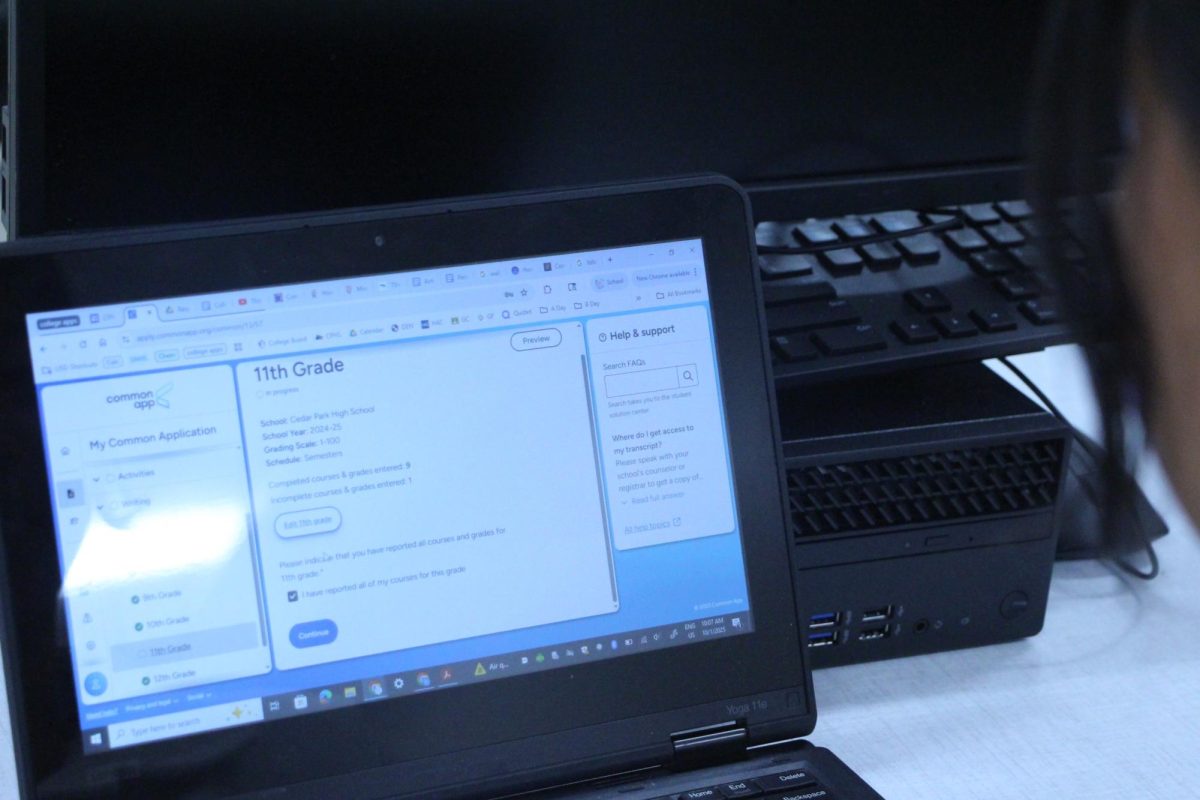



![As her hair blows in the wind, senior Brianna Grandow runs the varsity girls 5K at the cross country district meet last Thursday. Grandow finished fourth in the event and led the varsity girls to regionals with a third place placement as a team. “I’m very excited [to go to regionals],” Grandow said. “I’m excited to race in Corpus Christi, and we get to go to the beach, so that’s really awesome.” Photo by Addison Bruce](https://cphswolfpack.com/wp-content/uploads/2025/10/brianna.jpg)

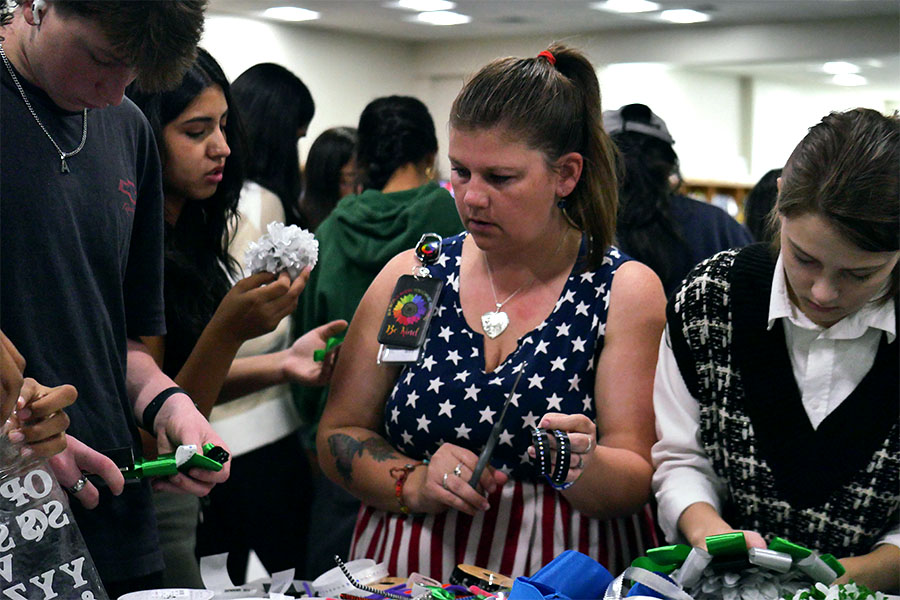
![Broadcast, yearbook and newspaper combined for 66 Interscholastic League Press Conference awards this year. Yearbook won 43, newspaper won 14 and broadcast took home nine. “I think [the ILPC awards] are a great way to give the kids some acknowledgement for all of their hard work,” newspaper and yearbook adviser Paige Hert said. “They typically spend the year covering everyone else’s big moments, so it’s really cool for them to be celebrated so many times and in so many different ways.”](https://cphswolfpack.com/wp-content/uploads/2025/05/edited-ILPC.jpg)





![Sitting with her friend senior Sohpia Struve at last year’s Austin City Limits Festival, senior Ava Zuniga poses for a picture under a pavilion. They are frequent attendees at ACL, an annual music festival at Zilker Park. “I would recommend seeing a bunch of people,” Zuniga said. “This past year, we camped out for Chappell [Roan] for a really long time. I think the whole point of ACL, [which] is a lot of fun, is that you can go see so many different people, even if you don’t know them. So by camping by one person, it really limits yourself from being able to go see a bunch of people.” Photo courtesy of Ava Zuniga](https://cphswolfpack.com/wp-content/uploads/2025/10/EE9E9484-FE6F-4AA0-B5F5-0C177AB32841-1200x857.jpeg)
![Looking down at his racket, junior Hasun Nguyen hits the green tennis ball. Hasun has played tennis since he was 9 years old, and he is on the varsity team. "I feel like it’s not really appreciated in America as much, but [tennis] is a really competitive and mentally challenging sport,” Nguyen said. “I’m really level-headed and can keep my cool during a match, and that helps me play a bit better under pressure.” Photo by Kyra Cox](https://cphswolfpack.com/wp-content/uploads/2025/09/hasun.jpg)

![Bringing her arm over her head and taking a quick breath, junior Lauren Lucas swims the final laps of the 500 freestyle at the regionals swimming competition on date. Lucas broke the school’s 18-year-old record for the 500 freestyle at regionals and again at state with a time of 4:58.63. “I’d had my eye on that 500 record since my freshman year, so I was really excited to see if I could get it at regionals or districts,” Lucas said. “ State is always a really fun experience and medaling for the first time was really great. It was a very very tight race, [so] I was a bit surprised [that I medaled]. [There were] a lot of fast girls at the meet in general, [and] it was like a dogfight back and forth, back and forth.” Photo by Kaydence Wilkinson](https://cphswolfpack.com/wp-content/uploads/2025/03/Kaydence-2.7-23-edit-2.jpg)
![As the support team sits and poses for a photo in the cafeteria with the counseling team they eagerly wait to start their day. "We [all] seem to be a team, I get up every day and there's days where I don't want to go to work today, but I'm thankful that I have a job and I'm blessed to have what I have," Christopherson said. Photo Courtesy of Julie Weltens.](https://cphswolfpack.com/wp-content/uploads/2025/01/AF9E8470-10D7-4C91-BF28-EC8F86BAB66C-1200x852.jpeg)
![Jumping off the ground, senior linebacker Bennett Patton snatches the ball out of the air for an interception at Thursday’s game against Chaparral. Patton had two interceptions in the 56-14 victory, tying the school record for interceptions in a game. “I was just playing the game,” Patton said. “[I’m] going to go into next week, forget about it and stay humble.” Photo by Harper Chapman](https://cphswolfpack.com/wp-content/uploads/2025/09/bennett-interception.jpg)
















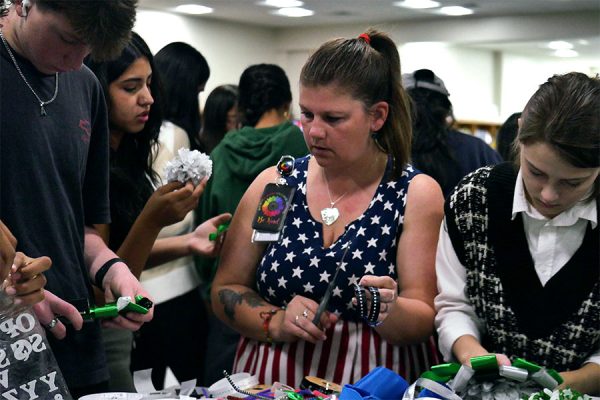
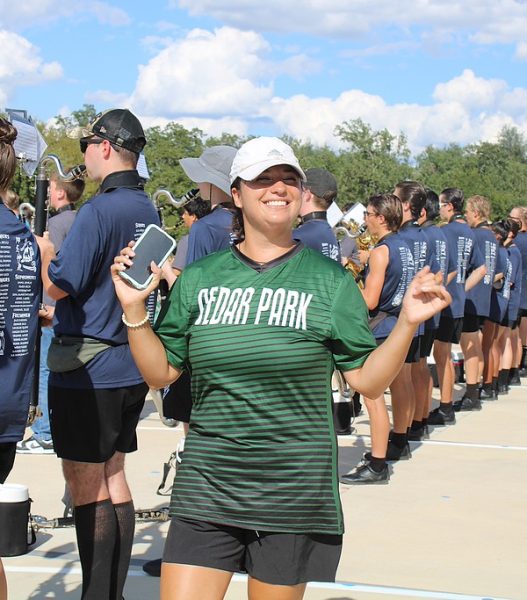
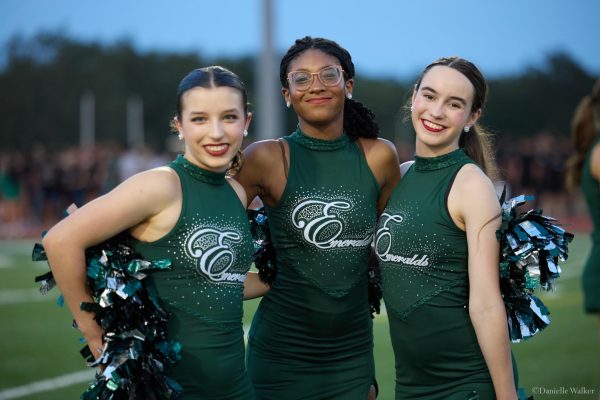
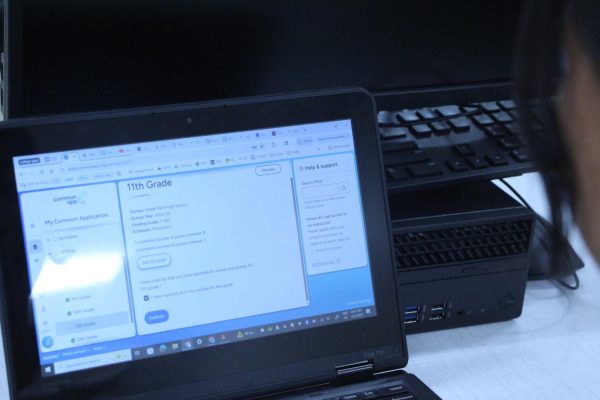

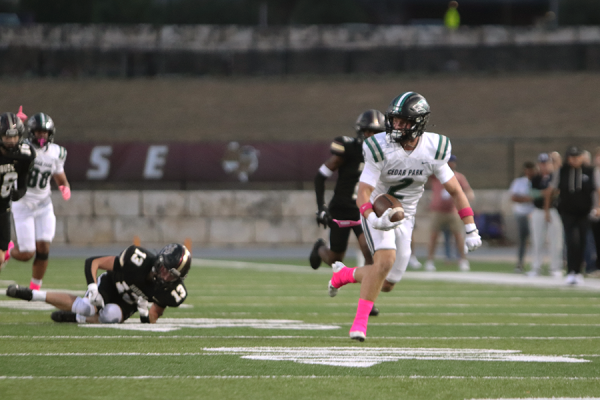
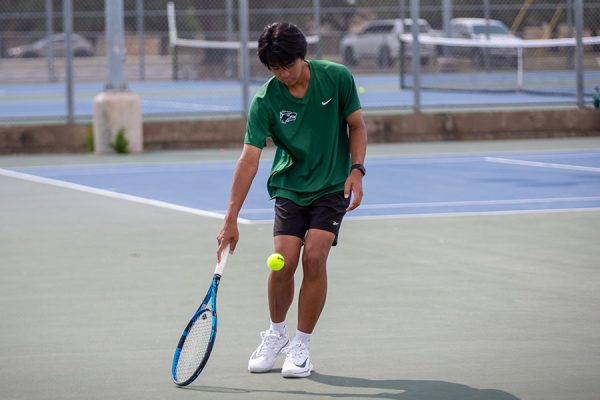
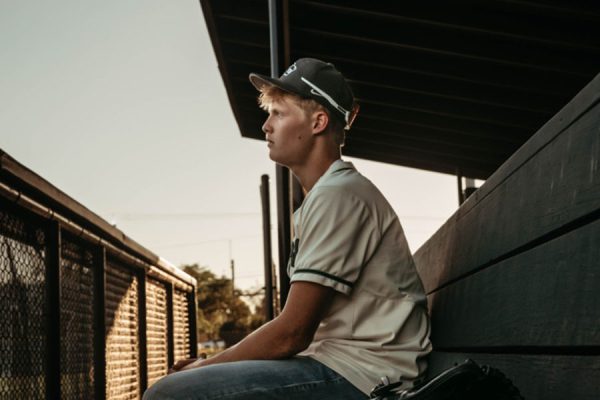

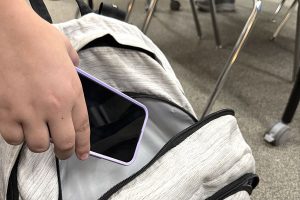
![The fire department came to the school after students were evacuated when smoke started coming from the ceiling of a classroom. All students and staff are safe. “All of my friends left their stuff too, so we couldn’t contact our parents, and it was stressful,” senior Brynn Fowler said. “It was scary because I didn’t know [what was going on], and I couldn’t find anyone because it was a big crowd.” Photo by Anthony Garcia](https://cphswolfpack.com/wp-content/uploads/2025/09/firetruck-300x200.jpg)


![Finishing her night out after attending a local concert, senior Grace Sauers smiles at the camera. She recently started a business, PrettySick, that takes photos as well as sells merch at local concert venues. Next year, she will attend Columbia Chicago College majoring in Graphic Design. “There's such a good communal scene because there [are] great venues in Austin,” Sauers said. “I'm gonna miss it in Austin, but I do know Chicago is good, it's not like I'm going to the middle of nowhere. I just have to find my footing again.” Photo Courtesy of Grace Sauers.](https://cphswolfpack.com/wp-content/uploads/2025/04/Grace-300x225.png)

